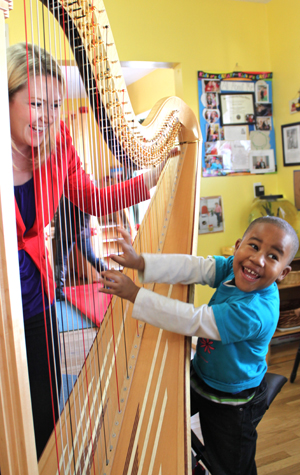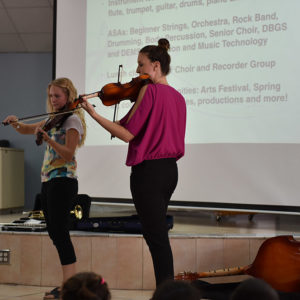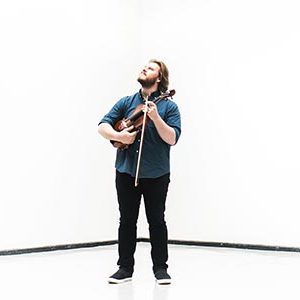“We’re going to create a story together,” harpist Meghan Caulkett says to the three- and four-year-olds gathered before her. “I’m going to play a modern piece called ‘Song in the Night,’ by Carlos Salzedo, and you tell me what you think it sounds like.”
The notes start out slow, each pluck of her harp’s strings pure and distinct. Then a leisurely glissando glides into double harmonics as she presses her palm against the strings, pinching two at once for a soft thrum. There will be no “Baa, Baa, Black Sheep” for these youngsters. They lean forward, entranced by Caulkett’s fingers as she plays the kind of music that many people never hear outside of an orchestra hall. For the children of Houston’s House of Tiny Treasures, an early childhood development center that serves homeless families, this concert is awe-inspiring.
The House of Tiny Treasures is just one of the places where Caulkett (CFA’10) performs through her outreach program, 47 Strings, which she created to foster a greater appreciation for—and understanding of—classical music. For each of the 47 harp strings, she is playing a concert for a homeless shelter, an elementary school, or a nursing home. “I don’t perform background music or filler classical music,” she says. “I’m trying to give the audiences really high-quality classical solo and chamber pieces. Just because people haven’t been exposed to classical music isn’t a reason to play easier pieces. You just have to present the music in a way that’s accessible.”
Her fingers pause on the strings.
“So what do you think that bit sounded like? Is it daytime or nighttime?” she asks the children.
“Daytime!” they shout. “The parents dropped the kids off at school,” says one, “and it’s daytime in the city.” From another: “And the kids play outside, and puppies come to play with them.”
By the end of the piece, the children have created a story that “reflected a very typical day for them. The tapping on the soundboard sounded to them like a knock on the door, and the quiet part reminded them of falling asleep. So, when I played the whole piece again, they understood it,” Caulkett says.
The children try the instrument after the performance. None of them had seen a harp before today, and they are hesitant, plucking gingerly at the strings. Unfamiliarity with the harp is not unique to this audience—Caulkett has found that her instrument mystifies almost everyone. “Every time I go to a gig, people tell me that they’ve never seen a real harp. Even some of my fellow musicians in orchestra concerts are still baffled by it,” she says, “and they sit 10 feet away from me.”

Meghan Caulkett introduces the harp to the children of Houston’s House of Tiny Treasures. Photo by Anni Hochhalter
She acknowledges that she was unacquainted with the harp at first. She grew up in a nonmusical family in the small ski town of Tahoe City, Calif., and discovered the piano on her own at the age of five. When a friend introduced her to the harp in high school, she fell in love the instant her fingers touched the strings. Her school didn’t have an orchestra, so she arranged her own parts and played with the school wind ensemble. Since the musical opportunities in Tahoe City were limited, she commuted to weekly private lessons in Reno, Nev., an hour away.
At the College of Fine Arts, Caulkett found the musical community she had been seeking. She performed with the BU Symphony Orchestra, the BU Opera Institute, and—a highlight of her academic career—for Prince Charles’ 60th birthday while studying abroad in London. Now a graduate student at Rice University, she aspires to be the principal harpist for a major orchestra, although she knows that each orchestra has only one full-time harpist. She doesn’t allow that to discourage her, and is already forging a robust career. “In music, I think you have to create your own opportunities,” she says. “Sometimes, if you want to perform, you have to initiate something yourself.”
Caulkett has found that her work with 47 Strings has made her a better artist. Sharing her passion for music nourishes her enthusiasm for her work at Rice, as well as her role as the principal harpist with the Baton Rouge Symphony Orchestra. “I definitely want to do orchestral playing as my career,” she says. “I love being part of a group and working with other really talented musicians, but I think it’s equally important to be involved in the community. Musicians can often get into the mind-set of practicing by ourselves for eight hours a day. I feel that it’s our responsibility as professional artists to help shape culture and help the general public understand what we do and why it’s relevant.”
To date, Caulkett has given 27 concerts through her music outreach program, performing classical repertoire for an estimated 1,700 people in nursing homes, homeless shelters, and schools.
A version of this article was originally published in the spring 2013 edition of Esprit.

















































A beautiful article. I work in medicine, but I shared with all my music and medical-music friends.